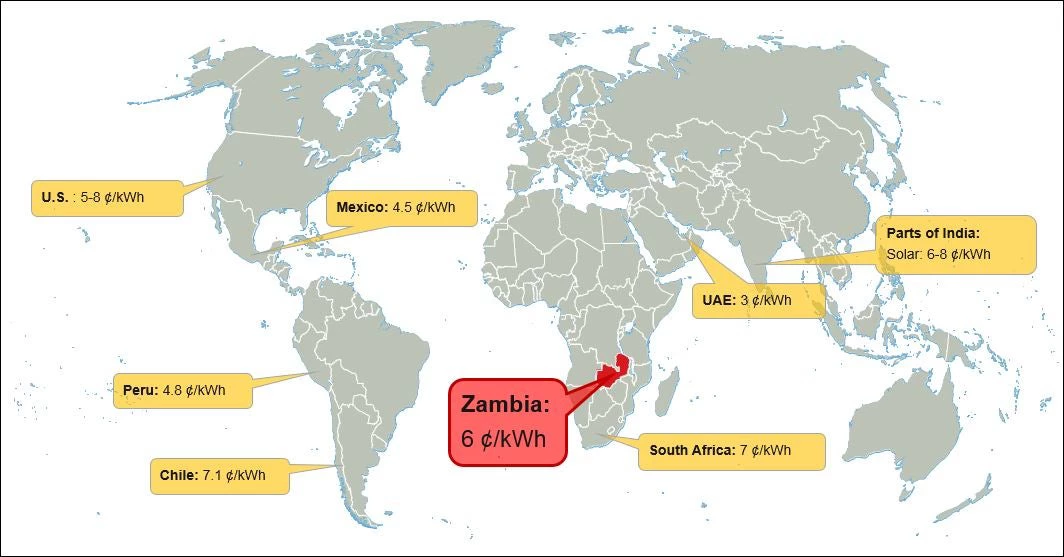
Last week Zambia set a new price record for utility-scale solar-generated energy in Africa with the support of the World Bank Group’s (WBG) Scaling Solar initiative. The auction for 100 MW (2x50 MW) resulted in a price as low as 6 cents/kWh.
This is good news for the country, which much like the rest of Sub-Saharan Africa faces acute electricity shortages. Nearly 700 million people in Sub-Saharan Africa don’t have access to electricity.
Zambia’s solar auction result followed a series of headline-making auctions in India, Mexico, Peru, and Dubai. In Dubai’s case, the price was as low as 3 cents/kWh -- the lowest price ever offered for solar power. Solar auctions are effectively a competitive bidding process to build power plants and supply a specific quantity of electricity at a pre-agreed price over a specified period of time.
There are a few reasons why Zambia’s outcome is more significant than Dubai’s.
First, Zambia’s 6 cents/kWh price is fixed and won’t increase for 25 years. This makes the average price in real terms an even more astonishing 4.7 cents/kWh .
Second, there aren’t any implicit or explicit subsidies involved in the deal, neither Zambia has a sophisticated and liquid financial market. The WBG simply helped structure the auction based on the best global practices – taking into account local specifications and providing a guarantee to back-stop the obligations of the national utility to pay for the electricity being supplied.
Third, Zambia has about 2400 MW of mostly hydro-based generation, compared to much larger systems in other countries with successful auctions. It also has a distressed macroeconomic situation coupled with weak institutional capacity in the energy sector. The Bank’s guarantee is critical to address the risks associated with these factors.
Most importantly, these results are dramatically shifting perceptions that low costs for renewable energy are unattainable in poor countries with weak institutions, underdeveloped laws and regulations, and high costs for conducting business. According to the Doing Business report, Zambia is ranked 97, compared to the United Arab Emirates (UAE), which is ranked 31.
While all the legal and financial agreements still need to be signed, this auction has launched a new era for clean energy in Africa and the rest of the world . As long as countries put in place a well-structured, transparent bidding process, mitigating country risks using guarantees and other financial insurance instruments, we can expect to see even lower prices in the months and years to come.
Scaling Solar is a World Bank Group solution that makes it easier for governments to quickly procure and develop large-scale solar projects with private financing. It includes a ‘one-stop shop’ package of technical assistance, templated documents, pre-approved financing, insurance products, and guarantees. Scaling Solar is designed to allow governments to get fast, affordable, utility-scale power up and running within two years of engagement. It has financing support of USAID’s Power Africa, the Ministry of Foreign Affairs of the Netherlands, the Ministry of Foreign Affairs of Denmark, and the Infrastructure Development Collaboration Partnership Fund (DevCo).


Join the Conversation